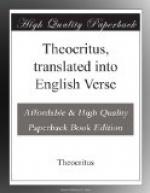Beside whose walls Anapus’ waters glide:—
May ill winds waft across the Southern sea
(Of late a legion, now but two or three,)
Far from our isle, our foes; the doom to tell,
To wife and child, of those they loved so well;
While the old race enjoy once more the lands
Spoiled and insulted erst by alien hands!
And fair and fruitful
may their cornlands be!
Their flocks in thousands
bleat upon the lea,
Fat and full-fed; their kine,
as home they wind,
The lagging traveller of his
rest remind!
With might and main their
fallows let them till:
Till comes the seedtime, and
cicalas trill
(Hid from the toilers of the
hot midday
In the thick leafage) on the
topmost spray!
O’er shield and spear
their webs let spiders spin,
And none so much as name the
battle-din!
Then Hiero’s lofty deeds
may minstrels bear
Beyond the Scythian ocean-main,
and where
Within those ample walls,
with asphalt made
Time-proof, Semiramis her
empire swayed.
I am but a single voice:
but many a bard
Beside me do those heavenly
maids regard:
May those all love to sing,
’mid earth’s acclaim,
Of Sicel Arethuse, and Hiero’s
fame.
O Graces, royal nurselings,
who hold dear
The Minyae’s city, once
the Theban’s fear:
Unbidden I tarry, whither
bidden I fare
My Muse my comrade. And
be ye too there,
Sisters divine! Were
ye and song forgot,
What grace had earth?
With you be aye my lot!
IDYLL XVII.
The Praise of Ptolemy.
With Zeus begin, sweet sisters,
end with Zeus,
When ye would sing the sovereign
of the skies:
But first among mankind rank
Ptolemy;
First, last, and midmost;
being past compare.
Those mighty ones of old,
half men half gods,
Wrought deeds that shine in
many a subtle strain;
I, no unpractised minstrel,
sing but him;
Divinest ears disdain not
minstrelsy.
But as a woodman sees green
Ida rise
Pine above pine, and ponders
which to fell
First of those myriads; even
so I pause
Where to begin the chapter
of his praise:
For thousand and ten thousand
are the gifts
Wherewith high heaven hath
graced the kingliest king.
Was not he born
to compass noblest ends,
Lagus’ own son, so soon
as he matured
Schemes such as ne’er
had dawned on meaner minds?
Zeus doth esteem him as the
blessed gods;
In the sire’s courts
his golden mansion stands.
And near him Alexander sits
and smiles,
The turbaned Persian’s
dread; and, fronting both,
Rises the stedfast adamantine
seat
Erst fashioned for the bull-slayer
Heracles.
Who there holds revels with




